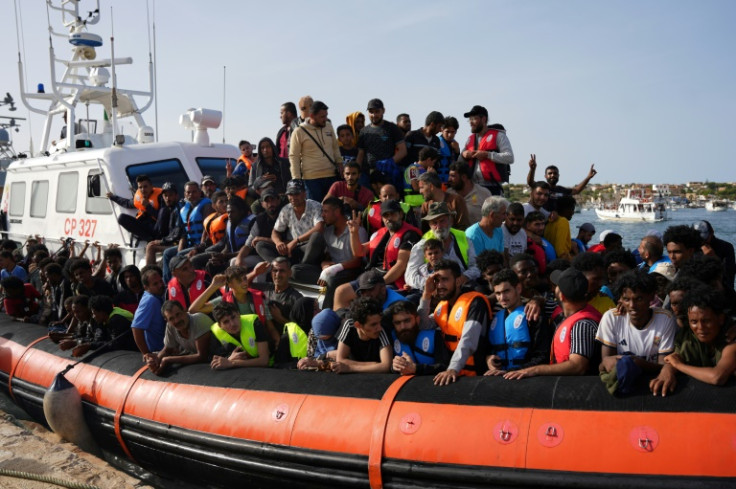Italian PM Admits She Hoped To Do 'Better' On Migration
Italian Prime Minister Giorgia Meloni has admitted she had hoped to do "better" on controlling irregular migration, which has surged since her far-right party won historic elections a year ago.

Italian Prime Minister Giorgia Meloni has admitted she had hoped to do "better" on controlling irregular migration, which has surged since her far-right party won historic elections a year ago.
"Clearly we hoped for better on immigration, where we worked so hard," she said in an interview marking the win, broadcast late Saturday on the TG1 channel.
"The results are not what we hoped to see. It is certainly a very complex problem, but I'm sure we'll get to the bottom of it."
Meloni's post-fascist Brothers of Italy party was elected in large part on a promise to reduce mass migration into Italy.
But the number of people arriving on boats from North Africa has instead surged, with more than 130,000 recorded by the interior ministry so far this year -- up from 70,000 in the same period of 2022.
After 8,500 people arrived on the tiny island of Lampedusa in just three days earlier this month, Meloni demanded the European Union do more to help relieve the pressure.
Brussels agreed to intensify existing efforts, and this week said it would start to release money to Tunisia -- from where many of the boats leave -- under a pact aimed at stemming irregular migration from the country.
But Meloni's main coalition partner, Matteo Salvini of the anti-immigration League party, has been dismissive of EU efforts to manage the surge of arrivals that he dubbed an "act of war".
The League this weekend also condemned Germany for funding an NGO conducting at-sea rescues in the Mediterranean, saying it represented "very serious interference" in Italian affairs.
Defence Minister Guido Crosetto, a member of Meloni's party, weighed in on Sunday, telling La Stampa newspaper the move put Italy "in difficulty".
"If Germany cared about the fate of people in difficulty and really wanted to help us save lives, they could help ... (with plans) to seriously combat criminals who traffic people," he added in a statement on Sunday evening.
Several charity rescue ships operate in the Central Mediterranean, the world's deadliest sea crossing for migrants, although they only pick up around five percent of arrivals to Italy, according to Crosetto.
The German foreign office confirmed it was providing between 400,000 euros and 800,000 euros each to two projects, "for the support on land in Italy of people rescued at sea and an NGO project for sea-rescue operations".
While interior minister in a previous government in 2019, Salvini blocked several charity ships from disembarking rescued migrants in Italy, a move that saw him prosecuted in Sicily on charges of kidnapping.
Since taking office in October, Meloni's government has restricted the activities of the ships, which it accuses of encouraging migrants, while vowing to clamp down on people smugglers.
It has also sought to boost repatriation of arrivals ineligible for asylum, including by building new detention centres and extending the time migrants can be held there.
It emerged this week it would also be requiring migrants awaiting a decision on asylum to pay a deposit of 5,000 euros or be sent to a detention centre, prompting accusations the state was charging "protection money".
The centre-left Democratic Party said earlier this week that "on immigration, the Italian right has failed".
"It continues on a path that is demagogic and consciously cynical, but above all totally ineffective both in the respect and safeguarding of human rights, and for the protection of Italy's interests," it said in a note.
The criticism of Germany comes after Berlin temporarily stopped accepting migrants living in Italy, after Rome itself suspended EU rules governing the distribution of migrants.
© Copyright AFP 2025. All rights reserved.





















